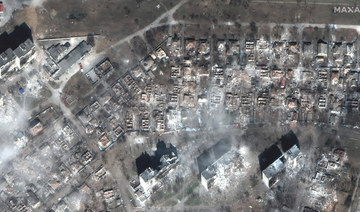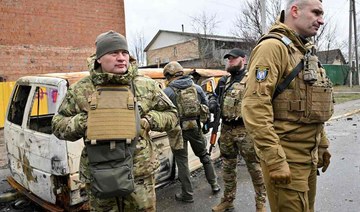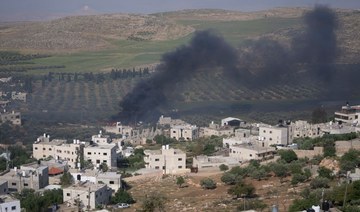KYIV: Russia vowed to continue its bloody offensive in Ukraine as the war neared its seventh week Wednesday, as President Vladimir Putin insisted the campaign was going as planned despite a major withdrawal and significant losses.
Thwarted in their push toward the capital, Kyiv, Russian troops focused on the eastern region of Donbas, where Ukraine said it was investigating a claim that a poisonous substance had been dropped on its troops. It was not clear what the substance might be, but Western officials warned that any use of chemical weapons by Russia would be a serious escalation of the already devastating war.
Russia invaded on Feb. 24 with the goal, according to Western officials, of taking Kyiv, toppling the government and installing a Moscow-friendly regime. In the six weeks since, the ground advance stalled and Russian forces lost potentially thousands of fighters and were accused of killing civilians and other atrocities.
Putin said Tuesday that Moscow “had no other choice” and that the invasion aimed to protect people in parts of eastern Ukraine and to “ensure Russia’s own security.” He vowed it would “continue until its full completion and the fulfillment of the tasks that have been set.”
Meanwhile Wednesday, Ukrainian President Volodymyr Zelensky was expected to receive the presidents of Poland, Lithuania, Latvia and Estonia — his staunch European allies.
“We are visiting Ukraine to show strong support for the Ukrainian people, will meet dear friend President Zelensky,” Estonian President Alar Karis tweeted.
For now, Putin’s forces are gearing up for a major offensive in the Donbas, where Russian-allied separatists and Ukrainian forces have been fighting since 2014, and where Russia has recognized the separatists’ claims of independence. Military strategists say Moscow believes local support, logistics and the terrain in the region favor its larger, better-armed military, potentially allowing Russia to finally turn the tide in its favor.
In Mariupol, a strategic port city in the Donbas, a Ukrainian regiment defending a steel mill alleged that a drone dropped a poisonous substance on the city. The assertion by the Azov Regiment, a far-right group now part of the Ukrainian military, could not be independently verified. The regiment indicated there were no serious injuries.
Zelensky said that while experts try to determine what the substance might be, “The world must react now.”
The claims came after a Russia-allied separatist official appeared to urge the use of chemical weapons, telling Russian state TV on Monday that separatist forces should seize the plant by first blocking all the exits. “And then we’ll use chemical troops to smoke them out of there,” the official, Eduard Basurin, said. He denied Tuesday that separatist forces had used chemical weapons in Mariupol.
Ukrainian Deputy Defense Minister Hanna Maliar said officials were investigating, and it was possible phosphorus munitions — which cause horrendous burns but are not classed as chemical weapons — had been used in Mariupol, which has been pummeled by weeks of Russian assaults.
Western leaders warned that if chemical weapons are found to have been used, it would amount to a grievous breach of international law.
President Joe Biden for the first time referred to Russia’s invasion as a “genocide” and said “Putin is just trying to wipe out the idea of even being a Ukrainian.”
The Pentagon said it could not confirm the drone report but reiterated US concerns about Russia using chemical agents. Britain, meanwhile, has warned that Russia may resort to phosphorus bombs, which are banned in civilian areas under international law, in Mariupol.
Most armies use phosphorus munitions to illuminate targets or to produce smoke screens. Deliberately firing them into an enclosed space to expose people to fumes could breach the Chemical Weapons Convention, said Marc-Michael Blum, a former laboratory head at the Netherlands-based Organization for the Prohibition of Chemical Weapons.
“Once you start using the properties of white phosphorus, toxic properties, specifically and deliberately, then it becomes banned,” he said.
In Washington, a senior US defense official said the Biden administration was preparing another package of military aid for Ukraine to be announced in the coming days, possibly totaling $750 million. The official spoke on condition of anonymity to discuss plans not yet publicly announced. Delivery is due to be completed this week of $800 million in military assistance approved by Biden a month ago.
In the face of stiff resistance by Ukrainian forces bolstered by Western weapons, Russian forces have increasingly relied on bombarding cities, flattening many urban areas and killing thousands. The war has driven more than 10 million Ukrainians from their homes — including nearly two-thirds of the country’s children.
Ukraine’s Deputy Prime Minister Iryna Vereshchuk said humanitarian corridors used to get people out of cities under Russian attack will not operate on Wednesday because of poor security.
She said that in the southeast Zaporizhzhia region, Russian troops blocked evacuation buses, and in the Luhansk region, they were violating the cease-fire. “The occupiers not only disregard the norms of international humanitarian law, but also cannot properly control their people on the ground. All this creates such a level of danger on the routes that we are forced to refrain from opening humanitarian corridors today.”
Moscow’s retreat from cities and towns around Kyiv led to the discovery of large numbers of apparently massacred civilians, prompting widespread condemnation and accusations of war crimes.
Zelensky said evidence of “inhuman cruelty” toward women and children in Bucha and other suburbs of Kyiv continued to surface, including alleged rapes.
“Not all serial rapists reach the cruelty of Russian soldiers,” Zelensky said.
More than 720 people were killed in Kyiv suburbs that had been occupied by Russian troops and over 200 were considered missing, the Interior Ministry said early Wednesday.
In Bucha alone, Mayor Anatoliy Fedoruk said 403 bodies had been found and the toll could rise as minesweepers comb the area.
In the Chernihiv region, villagers said more than 300 people had been trapped for almost a month by the occupying Russian troops in the basement of a school and only allowed outside to go to the toilet or cook on open fires.
Valentyna Saroyan told The Associated Press she saw at least five people die in Yahidne, 140 kilometers (86 miles) north of Kyiv. In one of the rooms, the residents wrote the names of those who perished during the ordeal — the list counted 18 people.
Villagers say they don’t know the cause of the deaths. Russian soldiers allowed them to remove the bodies from time to time in order to bury them in a mass grave at the local cemetery.
Julia Surypak said the Russians only allowed some people to make a short trip home if they sang the Russian anthem. Another resident, Svitlana Baguta, said a Russian soldier made her drink from a flask pointing a gun at her face.
Ukraine’s prosecutor-general’s office said Tuesday it was also looking into events in the Brovary district, which lies to the northeast. It said the bodies of six civilians were found with gunshot wounds in a basement in the village of Shevchenkove and Russian forces were believed to be responsible.
Prosecutors are also investigating allegations that Russian forces fired on a convoy of civilians trying to leave by car from the village of Peremoha in the Brovary district, killing four people including a 13-year-old boy. In another attack near Bucha, five people were killed including two children when a car was fired upon, prosecutors said.
Putin falsely claimed Tuesday that Ukraine’s accusation that hundreds of civilians were killed by Russian troops in the town of Bucha were “fake.” Associated Press journalists saw dozens of bodies in and around the town, some of whom had their hands bound and appeared to have been shot at close range.
Putin vows war will continue as Russian troops mount in east
https://arab.news/z5pbq
Putin vows war will continue as Russian troops mount in east
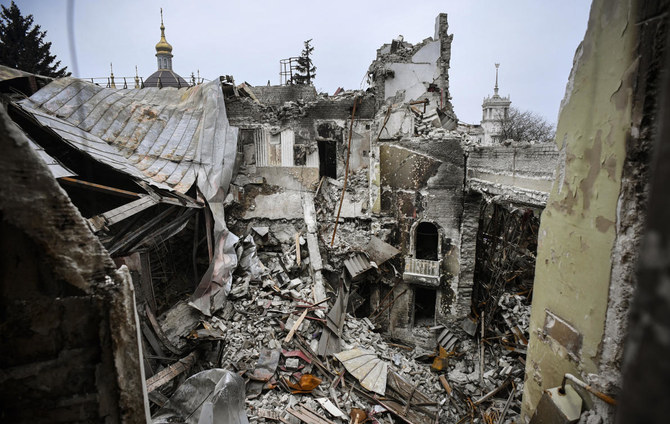
- Russia invaded on Feb. 24 with the goal, according to Western officials, of taking Kyiv, toppling the government and installing a Moscow-friendly regime
- For now, Putin’s forces are gearing up for a major offensive in the Donbas, where Russian-allied separatists and Ukrainian forces have been fighting since 2014
US sanctions fundraisers for extremist West Bank settlers who commit violence against Palestinians
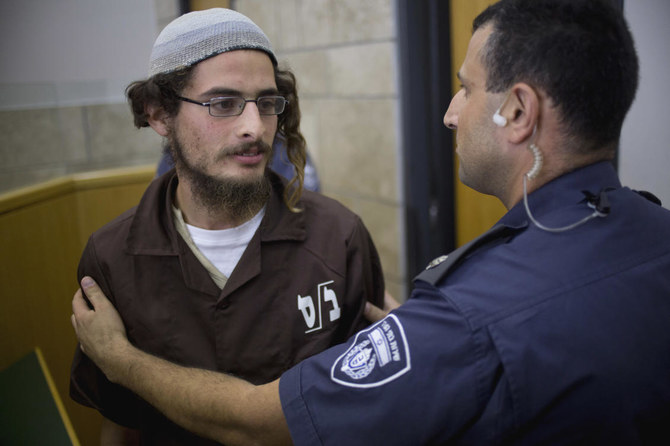
- Announcement comes as West Bank sees some of its worst violence perpetrated by extremist settlers against Palestinians since Gaza war
WASHINGTON: The Biden administration on Friday imposed sanctions on two entities accused of fundraising for extremist Israel settlers already sanctioned, as well as the founder of an organization whose members regularly assault Palestinians.
The Treasury Department announcement comes as the West Bank has seen some of its worst violence perpetrated by extremist settlers against Palestinians since the war in nearby Gaza began.
There is also friction between President Joe Biden and Israeli Prime Minister Benjamin Netanyahu, whose far-right government has reacted angrily to previous sanctions imposed against West Bank settlers.
Included in the Friday sanctions are two entities — Mount Hebron Fund and Shlom Asiraich — accused of raising funds for sanctioned settlers Yinon Levi and David Chai Chasdai.
Both men were previously sanctioned by the Biden administration for violently attacking Palestinians in the West Bank.
The penalties aim to block them from using the US financial system and bar American citizens from dealing with them.
The fundraising campaign established by Mount Hebron Fund for Levi and by Shlom Asiraich for Chasdai generated the equivalent of $140,000 and $31,000, respectively, according to US Treasury.
In Levi’s case, the fund now sanctioned by the Biden administration is linked to the regional council in the area, a body that receives state money. The Biden order Friday stopped short of sanctioning the council itself.
Rights groups say that the expansion of illegal settler outposts in the West Bank is enthusiastically supported by the regional councils and nudged along by Israel’s current national government — the most far-right in the country’s history.
The Biden order also skirted sanctioning crowdfunding websites where funds were raised, GiveChak and New York-based Charidy.
In Chasdai’s case, the fundraiser on Charidy was organized by Shlom Asiraich, which raises money for imprisoned Jewish extremists.
Both online fundraisers have now been taken down. But at least one fundraiser linked to a settler previously sanctioned by the Biden administration, Moshe Sharvit, remains online. As of Friday, the page on GiveChak had raised the equivalent of over $879,000.
Additionally, the State Department is designating Ben-Zion Gopstein, the founder and leader of Lehava, an organization whose members have assaulted Palestinian civilians.
Treasury Deputy Secretary Wally Adeyemo said the organizations “undermine the peace, security, and stability of the West Bank. We will continue to use our tools to hold those responsible accountable.”
In February, Biden issued an executive order that targets Israeli settlers in the West Bank who have been accused of attacking Palestinians and Israeli peace activists in the occupied territory.
Hindu-Muslim divisions sway voting in Indian district scarred by deadly riots

- Villages are largely self-segregated by religion in and around Muzaffarnagar in the most populous Uttar Pradesh state
- Violent clashes broke out in 2013 after two Hindus stabbed Muslim youth to death, accusing him of harassing their sister
MUZAFFARNAGAR: Hindu-Muslim enmity made way for peace in an Indian district that saw deadly riots a decade ago but religious divisions still influence residents who voted on Friday in general elections in which Hindu nationalism is a key theme.
Villages are largely self-segregated by religion in and around Muzaffarnagar district, in the most populous northern state of Uttar Pradesh, but people say there is no longer tension between the majority Hindu and minority Muslim communities.
Violent clashes broke out here in 2013 after two Hindus stabbed a Muslim youth to death, accusing him of sexually harassing their sister. They were later beaten to death by a Muslim mob, which sparked riots that killed about 65 people, mostly Muslims, and displaced thousands.
Violence has not returned to the district known as the country's sugarcane-belt, but political divisions remain as Hindus typically vote for Prime Minister Narendra Modi's Bharatiya Janata Party (BJP) and Muslims for the opposition.
Modi's government has "controlled Muslims", said Ramesh Chand, a Hindu biscuit baker in Kairana city near Muzaffarnagar.
Critics accuse the nationalist BJP of targeting India's 200 million minority Muslims to please their hardline Hindu base - charges they deny.
Modi is widely expected to win a third term on the back of strong growth, welfare and his personal popularity despite some concern about unemployment, price rises and rural distress.
Chand said Modi had improved security in the region. "We can live in peace, whether or not we have jobs ... We can sleep with our doors open."
There were opposing views too.
In Jaula village, sugarcane farmer Mohammed Irfan, 50, said Modi's "high-handedness against Muslims" as well as unemployment and inflation were major reasons for him voting for the opposition Samajwadi Party.
Uttar Pradesh elects 80 lawmakers to the 543-member lower house of parliament, the most among all states, and a strong showing here is critical to the nationwide outcome.
Support for Modi was visible in Kutba Kutbi village, the epicentre of the 2013 riots.
Although there is "brotherhood" between the two communities now, nearly all Muslim families left the village after the riots, said Vinay Kumar Baliyan, 43, a farmer who said he supports Modi for promoting economic growth and raising India's stature globally.
But Irfan said Muslims are expected to vote in larger numbers this time as Eid celebrations this month brought many migrant workers and students home.
After Pakistan alert, WHO likely to issue wider warning on contaminated J&J cough syrup

- The UN health body said it puts out global medical product alerts to ‘encourage diligence’ by authorities
- The WHO this week sent out alert on five batches of contaminated cough syrup ingredients found in Pakistan
LONDON: The World Health Organization is likely to issue a wider warning about contaminated Johnson and Johnson-made children’s cough syrup found in Nigeria last week, it said in an email.
Nigeria’s regulator recalled a batch of Benylin paediatric syrup last Wednesday, having found a high level of diethylene glycol in the product during routine testing.
The contaminant, alongside another closely related toxin, ethylene glycol, has been linked to the deaths of more than 300 children in Cameroon, Gambia, Indonesia and Uzbekistan since 2022, though there is no evidence that these incidents are linked with the latest recalls.
The UN health body said it puts out global medical product alerts to “encourage diligence” by national authorities and was likely to do so in this instance, “subject to confirmation of certain details from parties.”
The recalled batch of Benylin syrup was made by J&J in South Africa in May 2021, although Kenvue now owns the brand after a spin-off from J&J last year.
J&J has referred requests for comment to Kenvue. In an emailed statement on Friday, Kenvue said it had carried out tests on the batch recalled by Nigeria and had not detected either diethylene or ethylene glycol.
“We continue to work closely with health authorities and the WHO and are engaging with NAFDAC to understand their test results, including verifying the authenticity of the sampled product, the testing methodology used, and results reported by the agency,” the statement added.
Since Nigeria’s recall, five other African countries have also pulled the product from shelves — Kenya, Rwanda, Tanzania, Zimbabwe and South Africa, where the drug was made.
South Africa’s regulator has also recalled another batch of the syrup, which is used to treat coughs, hay fever and other allergic reactions in children.
Diethylene glycol is toxic to humans when consumed and can result in acute kidney failure, although there have been no reports of harm in the latest incident.
RAW MATERIALS
In the 2022 cases, the contamination in the syrups came from the raw materials used by manufacturers in India and Indonesia.
The WHO said it was collaborating with both the manufacturer and regulatory authority in South Africa to investigate the Benylin paediatric syrup, and had information on the source of the ingredients used. Kenvue has previously said it tested its ingredients before manufacture.
The agency said the possibility that the syrup was counterfeit was also “under consideration as part of investigations.”
Earlier this week the WHO sent out a separate alert on five batches of contaminated cough syrup ingredients found in Pakistan that appeared to have been falsely labelled as Dow Chemical products.
It was the first alert the WHO has sent on excipients — elements of a medicine other than the active pharmaceutical ingredient — rather than finished products, the agency confirmed on Friday.
The batches of propylene glycol were contaminated with ethylene glycol.
“It was critical for WHO to also alert manufacturers that may have been procuring this material to exercise more caution,” a WHO spokesperson said by email.
Propylene glycol is not an ingredient in Benylin paediatric syrup, a Kenvue spokesperson said on Friday.
Polish flag carrier LOT cancels Friday flights to Tel Aviv and Beirut, PAP reports

- Decisions about future flights would be made on an ongoing basis
WARSAW: Polish national airline LOT canceled flights on Friday to Tel Aviv and Beirut due to the unstable situation in the region, a spokesperson was quoted as saying by state news agency PAP.
“Today’s flight 151/152 to Israel from Warsaw and to Beirut 143/144 have been canceled,” Krzysztof Moczulski told PAP. He said decisions about future flights would be made on an ongoing basis.
French police arrest man who threatened to blow himself up at Iran’s Paris consulate

- Police verifying man’s identity and trying to determine whether he had weapons
PARIS: A man who had threatened to blow himself up at Iran’s consulate in Paris was arrested by police, a police source said.
French police earlier cordoned off the Iranian consulate, Reuters reporters saw, and did not immediately confirm finding any weapons.
A police source told Reuters the man was seen at about 11 am (0900 GMT) entering the consulate, carrying what appeared to be a grenade and explosive vest.
A Paris police official told The Associated Press that officers were verifying the man’s identity and trying to determine whether he had weapons.
Police earlier said they were at the scene and asked the public to avoid the area but provided no further details.
Service was interrupted on a nearby metro line for security reasons, the RATP metro company said.
A police cordon remained in place on Friday afternoon, but traffic was resuming in the area.
A person at the Iranian embassy who responded to a call from Reuters declined to provide any information on the situation.
It was unclear whether the incident had any link to the escalating tensions between Iran and Israel.
Earlier on Friday, explosions echoed over the Iranian city of Isfahan in what sources described as an Israeli attack, but Tehran played down the incident and indicated it had no plans for retaliation — a response that appeared gauged toward averting region-wide war.
The incident also comes as Paris is gearing up to host the summer Olympics.
* With Reuters and AP



